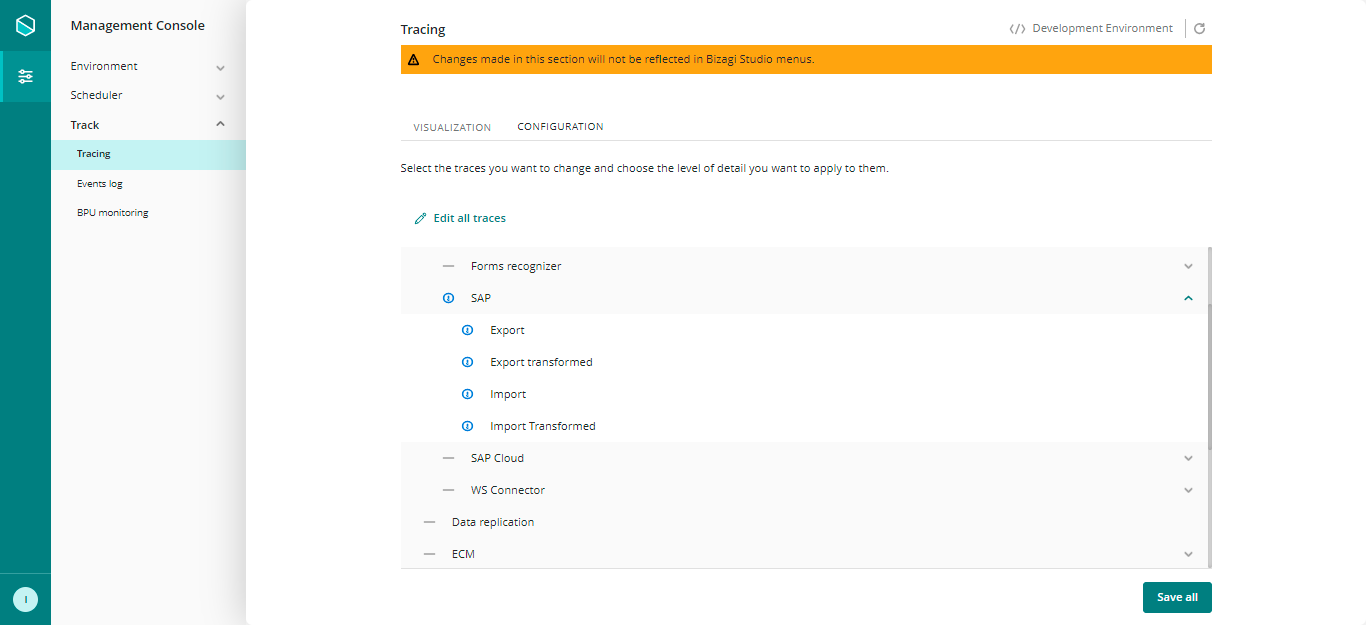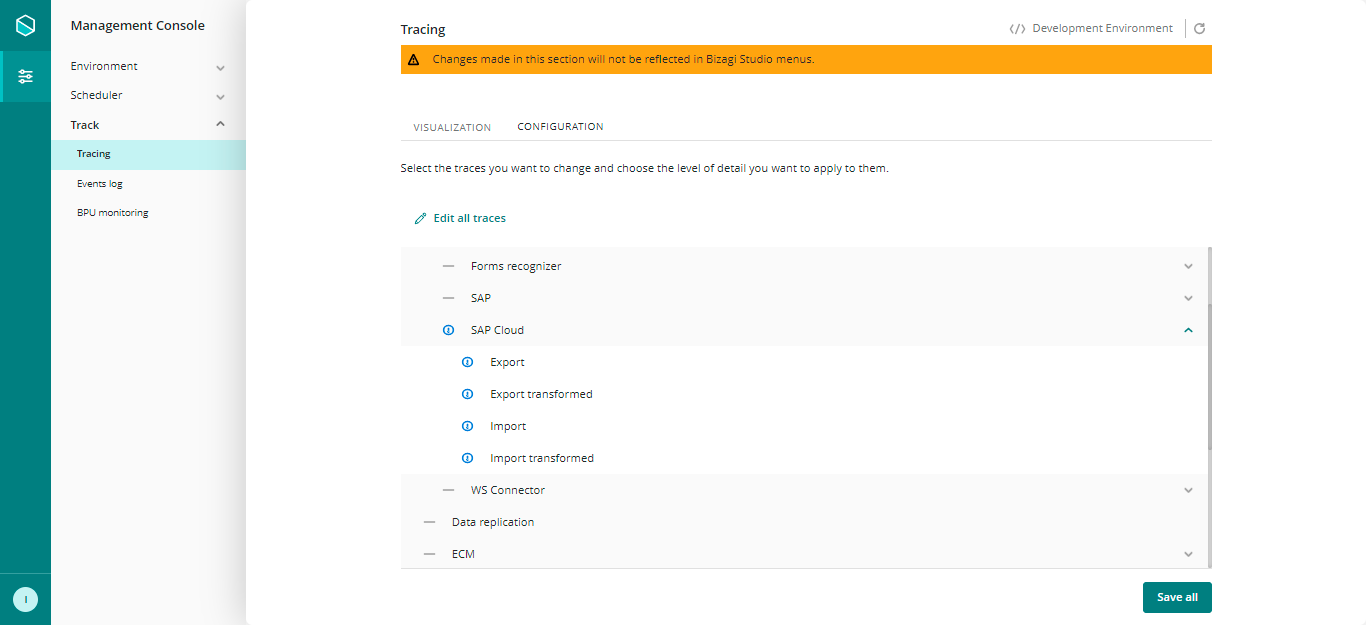Overview
Bizagi offers two types of SAP out-of-the-box connectors. One connector for SAP legacy systems using BAPI invocations, and one connector to integrate the SAP Cloud Platform using OData services. When invoking any of these connectors in Bizagi, you may rely on several features for error control and diagnostics. One of these features is the use of Traces whenever you detect there is an issue with the invocation, and you wish to retrieve further detail.
See the details of traces for both SAP connector types:
•SAP Cloud Connector with OData
Traces of the SAP connector with BAPIs
Whenever you are debugging a SAP BAPI invocation (in Development environments) or whenever you wish to retrieve further detail about a failed invocation, you may choose to turn on the SAP traces.

|
Keep in mind that SAP traces can be enabled anytime, but it is strongly recommended to enable them temporarily only when needed (and afterward, disable them). Changes in this configuration will require to run the Work Portal again. |
Enabling these traces is useful to track down, after an error in the application, the exact point where said error has happened. There are four points where details are logged and you may diagnose if there is a problem with your SAP BAPI (target's invocation), or whenever transformations were being applied to the information.
Types of traces
The following traces are logged in chronological order.
Chronological order |
Trace type |
Description |
|---|---|---|
1 |
Import |
Leaves an XML-structured log with information of how the mapping is done for the Import parameters (involving transformation functions). The following convention is followed: BizagiSAPImport[timestamp].xml Note that timestamp is set as yyyyMMddHHmm. |
2 |
Import Transformed |
Leaves an XML-structured log with the business information retrieved from Bizagi. The following convention is followed: BizagiSAPImportTransformed[timestamp].xml Note that timestamp is set as yyyyMMddHHmm. |
3 |
Export |
Leaves an XML-structured log with information of how the mapping is done for the Export parameters (involving transformation functions). The following convention is followed: BizagiSAPExportTransformed[timestamp].xml Note that timestamp is set as yyyyMMddHHmm. |
4 |
Export Transformed |
Leaves an XML-structured log with the business information incoming from the SAP BAPIs export. The following convention is followed: BizagiSAPExportTransformed[timestamp].xml Note that timestamp is set as yyyyMMddHHmm. |
Traces of the SAP Cloud Platform connector with Odata
These are traces used for the error handling of the SAP Cloud Connector.

|
Keep in mind that traces can be enabled anytime, but it is strongly recommended to enable them temporarily only when needed (and afterward, disable them). Changes in this configuration will require a reset in your Bizagi Server's services. |
Enabling these traces is useful to track down, after an error in the application, the exact point where said error has happened. There are 4 points where details are logged and you may diagnose if there is a problem with your SAP Cloud Connector (target's invocation), or whenever transformations were being applied to the information.
Types of traces
The following traces are logged in chronological order.
Chronological order |
Trace type |
Description |
|---|---|---|
1 |
Import |
Leaves a JSON-structured log with information of how the mapping is done for the inputs parameters (involving transformation functions). The following convention is followed: [TIME STAMP]_SAP-CP_IN0_[CASE NUMBER]_[SAP ACTION].json |
2 |
Import Transformed |
Leaves a JSON-structured log of the information as sent to the SAP system. The following convention is followed: [TIME STAMP]_SAP-CP_IN1_[CASE NUMBER]_[SAP ACTION].json |
3 |
Export |
Leaves a JSON-structured log with information of how the mapping is done for the output parameters (involving transformation functions). The following convention is followed: [TIME STAMP]_SAP-CP_OU0_[CASE NUMBER]_[SAP ACTION].json |
4 |
Export Transformed |
Leaves a JSON-structured log with the business information incoming from the SAP system. The following convention is followed: [TIME STAMP]_SAP-CP_OU1_[CASE NUMBER]_[SAP ACTION].json |
Where:
•Time Stamp is set in yyyyMMddHHmm.
•Case Number: Is the case number when the sap action associated with the trace was executed.
•SAP Action: This is the name of the action as configured in Bizagi. See Configure the SAP Cloud Platform Connector documentation.
Last Updated 2/6/2024 8:31:12 PM